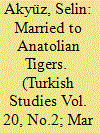| Srl | Item |
| 1 |
ID:
102602


|
|
|
|
|
| Publication |
2011.
|
| Summary/Abstract |
This article critically reviews the current literature on 'Islamic capital' in Turkey. Instead of a culturalist account that primarily focuses on conservative lifestyles and religious orientations of entrepreneurs as the main indicator of class formation, it tries to identify a criterion on which 'Islamic capital' as such can be identified as a separate capital fraction that can pursue a distinct and collective agenda. It discusses the symbiotic relationship between interest-free banks, firms, religious networks and communal linkages in order to understand this peculiar way of capital accumulation in relation to Islamic motifs. It also provides guidelines to understand what the future may hold for this specific capital fraction and assess the explanatory capacity of the term 'Islamic capital' under present conditions.
|
|
|
|
|
|
|
|
|
|
|
|
|
|
|
|
| 2 |
ID:
169042


|
|
|
|
|
| Summary/Abstract |
This paper examines business masculinities and relationalities of empowerment in the everyday life experiences of male entrepreneurs and wives of entrepreneurs in three urban centers in Turkey: Gaziantep, Konya and İzmir. We take gendered power inequalities as structural and relational, and empowerment as a complex, multifaceted process. Based on a relational understanding of gender roles, we scrutinize men’s and women’s decision making areas in an attempt to understand normalized and internalized patriarchal values and assumptions, as well as explicit or implicit challenges against such values. We argue that gendered experiences of entrepreneurs and women married to entrepreneurs offer a complementary analysis of nuanced empowerment strategies in the background of seemingly contradictory currents such as economic globalization, transforming masculinities, rising conservatism and reinforced gender hierarchies.
|
|
|
|
|
|
|
|
|
|
|
|
|
|
|
|